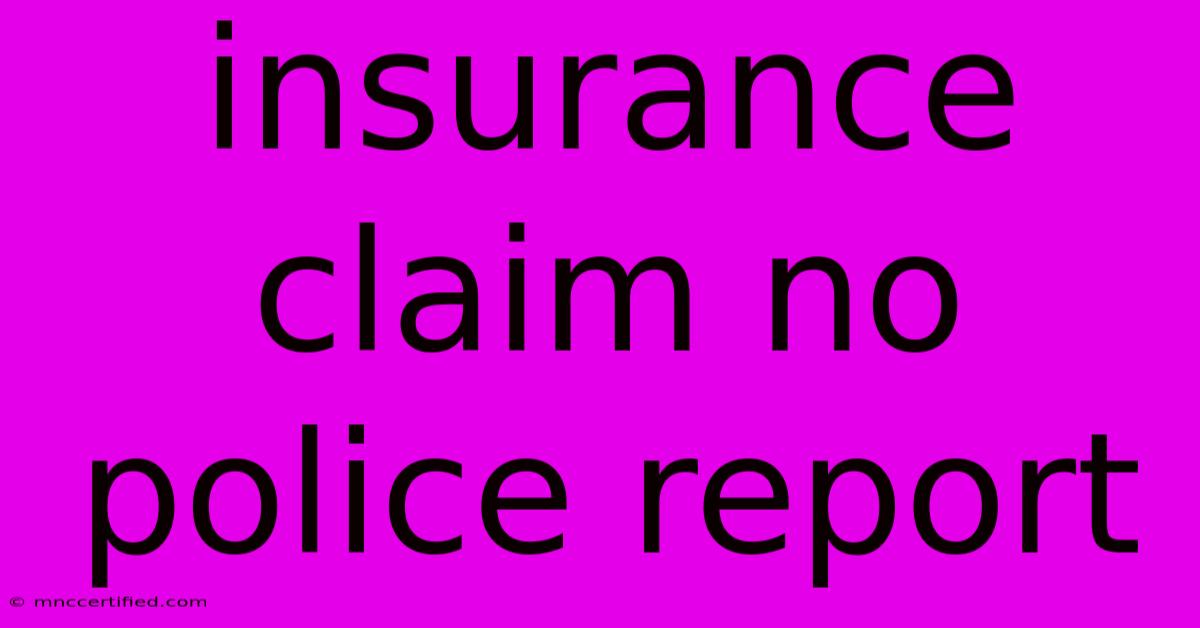Insurance Claim No Police Report

Table of Contents
Insurance Claim Without a Police Report: When It's Possible and What to Do
Filing an insurance claim can be stressful, especially when you're unsure if you need a police report. Many people automatically assume a police report is mandatory, but that's not always the case. This article will clarify when you can file an insurance claim without a police report and guide you through the necessary steps.
When a Police Report Isn't Required for an Insurance Claim
While a police report is often recommended, it isn't always a requirement for filing an insurance claim. Here are some scenarios where you might be able to proceed without one:
Minor Damage with No Injuries:
- Example: A small dent in your car from a shopping cart, or a minor scratch from a low-speed incident with no visible damage to either vehicle.
- Reasoning: In cases of minor damage where there are no injuries and liability is clear, your insurance company might accept your claim without a police report. The cost of repairs might be less than the deductible, making a report unnecessary.
Damage Occurring on Private Property:
- Example: A tree falling on your car in your driveway, or damage to your home during a private party.
- Reasoning: Police typically don't respond to incidents solely on private property unless there's a criminal element involved. Your insurance company will likely focus on the evidence you provide, such as photos and witness statements.
Single-Vehicle Accidents:
- Example: You hit a deer, drove into a ditch, or experienced a single-car accident due to a mechanical failure.
- Reasoning: While a police report can be helpful, especially if you need to prove the incident wasn't your fault (e.g., mechanical failure), it's not always mandated for single-vehicle accidents.
What to Do When Filing a Claim Without a Police Report
Even when a police report isn't required, thorough documentation is crucial for a successful claim. Here's what you should do:
1. Document Everything:
- Take photos and videos: Thoroughly document the damage to your property with high-quality photos and videos from multiple angles. This is the most crucial piece of evidence you will have.
- Gather witness information: If there were witnesses, get their names, contact information, and written statements describing what they saw.
- Record the date, time, and location: Precise details are vital. The more accurate your information, the smoother the claims process will be.
2. Report the Incident to Your Insurance Company Immediately:
- Contact your insurer: Don't delay – report the incident as soon as possible. Provide all the details you've gathered, including photos and witness statements.
- Follow their instructions: Your insurance company will guide you through the next steps and might ask for additional documentation. Be cooperative and responsive.
3. Be Honest and Accurate:
- Transparency is key: Provide accurate information to your insurance provider. Any discrepancies could delay or even deny your claim.
- Maintain clear communication: Keep records of all communication with your insurance company, including dates, times, and the names of the people you spoke with.
4. Consider Professional Assistance:
- Public Adjuster: If the damage is significant or your claim is complex, consider hiring a public adjuster. They have experience handling insurance claims and can assist you in negotiating a fair settlement.
- Attorney: If you believe your claim is being unfairly handled, consulting an attorney specializing in insurance law can protect your rights.
When a Police Report IS Necessary
While not always required, a police report significantly strengthens your claim in certain situations. These include:
- Accidents involving injuries: Police reports document injuries and the circumstances of the accident, crucial for liability determination in injury cases.
- Hit-and-run accidents: A police report is crucial evidence for tracking down the at-fault driver.
- Accidents involving significant damage: Major accidents with substantial property damage generally require police involvement.
- Disputes about fault: If liability is unclear, a police report provides an independent account of the event.
Keywords for SEO Optimization:
- insurance claim
- no police report
- car accident
- home insurance claim
- insurance claim process
- minor damage
- single vehicle accident
- property damage
- police report required
- insurance claim documentation
By following these steps and understanding when a police report is necessary, you can navigate the insurance claim process effectively, even without a police report in certain situations. Remember, thorough documentation is your best ally.

Thank you for visiting our website wich cover about Insurance Claim No Police Report. We hope the information provided has been useful to you. Feel free to contact us if you have any questions or need further assistance. See you next time and dont miss to bookmark.
Featured Posts
-
Stalker 2 Review Ign Progress Update
Nov 21, 2024
-
Liam Paynes Funeral One Direction Support
Nov 21, 2024
-
18 30 An Hour Is How Much A Year
Nov 21, 2024
-
Jamie Lee Komoroski Bond Hearing
Nov 21, 2024
-
Racing On Tv November 15 17 Schedule
Nov 21, 2024